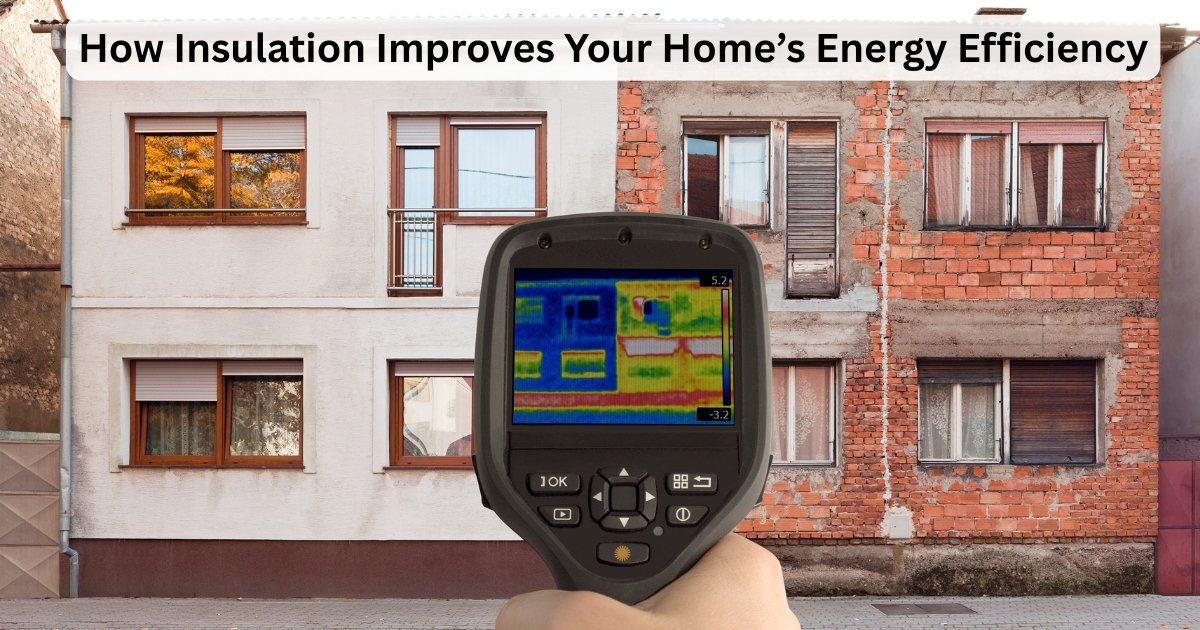Insulation makes your home more energy efficient

Insulation makes your home more energy efficient
You can’t beat proper insulation when it comes to improving your home’s energy efficiency. If you’re looking for ways to reduce energy bills and make your house more comfortable, many homeowners wonder how insulation can improve your home’s energy efficiency. Insulation makes your home more energy efficient. In your home, insulation prevents heat from transferring between the inside and outside. Here’s what you need to know about insulation, its types, and the pros and cons to help you decide.
Understanding Insulation’s Role in Home Efficiency
During the winter, your home loses heat, while in the summer, it gains it. Insulation plays a crucial role in keeping your home’s temperature stable. Once you realize how insulation helps regulate temperature and reduces the strain on your heating and cooling systems, you’ll see how it makes your home more energy efficient. Insulating your home right reduces the amount of energy you need to keep it comfortable, so your bills go down.
Insulation Types and Their Impact on Efficiency
Home insulation comes in many forms, each with its own advantages.
- There are 3 types of fiberglass insulation: batt, roll, and loose-fill. It consists of tiny glass fibers that reduce heat transfer.
- Insulation with spray foam fills gaps and cracks, creating an airtight seal that reduces air leaks and improves the efficiency of your home.
- Using cellulose insulation prevents heat transfer and is eco-friendly.
- It provides excellent thermal resistance and is durable over time. It’s commonly used in basements and crawl spaces.
Insulation has different effects on energy efficiency. You should choose insulation based on factors like your location, budget, and the area you intend to insulate in your home.
Minimizing heat loss with insulation improves your home’s energy efficiency
The biggest cause of energy inefficiency in homes is heat loss. Insulation helps to minimize it by acting as a barrier. In the winter, it keeps warm air in. Insulation keeps heat out in the summer, so you don’t have to use too much air conditioning to stay cool. You can understand how insulation improves your home’s energy efficiency by considering how it limits the amount of work your heating and cooling systems have to do, thus saving you money.
The Power of Insulation and Air Sealing
Insulation is often the only thing people think about when it comes to improving energy efficiency. However, insulation is only as effective as air sealing when it’s combined with proper air sealing. Air leaks around windows, doors, and other openings can make insulation less effective. Insulating your house and sealing air leaks makes it more energy efficient and tighter. As a result, your home’s air stays where it should, reducing energy costs.
Insulation’s environmental impact
By reducing energy consumption, insulation helps reduce your carbon footprint. Insulation not only benefits your house, but also the environment. By using less energy, fewer fossil fuels are burnt to generate electricity, which means less pollution. You can also see how insulation improves your home’s energy efficiency by how it contributes to a greener, more sustainable future.
The benefits of insulation for your home’s energy efficiency
Insulation improves your home’s energy efficiency for several reasons. Here are a few:
- Reduced energy bills: Insulation reduces heat loss and the need for constant heating and cooling.
- It’s more comfortable to live in a well-insulated home because it maintains a consistent temperature throughout.
- Increasing resale value: Homes with better energy efficiency are more appealing to buyers.
- You’ll have better indoor air quality because insulation prevents drafts and moisture buildup.
When you understand how insulation improves your home’s energy efficiency, you can enjoy these benefits while saving money.
Insulation Costs
While the benefits of insulation are clear, it’s important to understand the costs involved. The initial investment in insulation can vary depending on the type of insulation, the size of your home, and the complexity of the installation process. In Canada, some government programs offer rebates and incentives to make insulation cheaper for homeowners, so long-term energy savings usually offset them.
Insulation’s pros and cons
You can make an informed decision about insulation for homes by understanding the pros and cons.
The pros:
- Maintain a stable temperature with insulation to reduce energy bills.
- By reducing temperature fluctuations, insulation provides a more comfortable indoor climate.
- Benefits to the environment: Reduced energy consumption leads to a smaller carbon footprint.
- Reduced sound transmission: Insulation can also reduce sound transmission, making indoor spaces quieter.
The cons:
- Installing insulation can be expensive, especially for bigger houses.
- The installation process can be disruptive, especially if the existing insulation needs to be replaced.
- Certain types of insulation, like fiberglass, can settle over time and need to be replaced.
Even so, the pros generally outweigh the cons, especially when you think about how insulation can improve your home’s energy efficiency over time.
An example of how insulation improves energy efficiency
This is an example of how insulation improves energy efficiency in a Canadian home. Heating and cooling are a big part of the monthly energy bill in a typical Canadian house. This homeowner noticed a drastic reduction in heating costs after installing spray foam insulation in the attic. Furthermore, the home stayed cool without overcooling during the summer. The homeowner’s overall energy bills dropped by nearly 30%, showing how insulation improves your home’s efficiency.
Insulating Your Home Right
There are a lot of factors to consider when choosing the right insulation for your home. Your climate, the layout, and your budget all play a role in your decision. A professional can help you decide which type of insulation is right for you. Companies like Bestway Insulation Canada help homeowners pick the right insulation.
Insulation Maximizes Your Home’s Energy Efficiency
Clearly, insulation makes your home more energy efficient. Insulation keeps a comfortable indoor environment while reducing energy consumption by preventing heat loss in the winter and blocking excess heat in the summer. You can save money and save the environment by using the right insulation and air sealing in your home.
Visit Bestway Insulation Canada and join our Facebook community to learn more about how insulation can improve your home’s energy efficiency.



